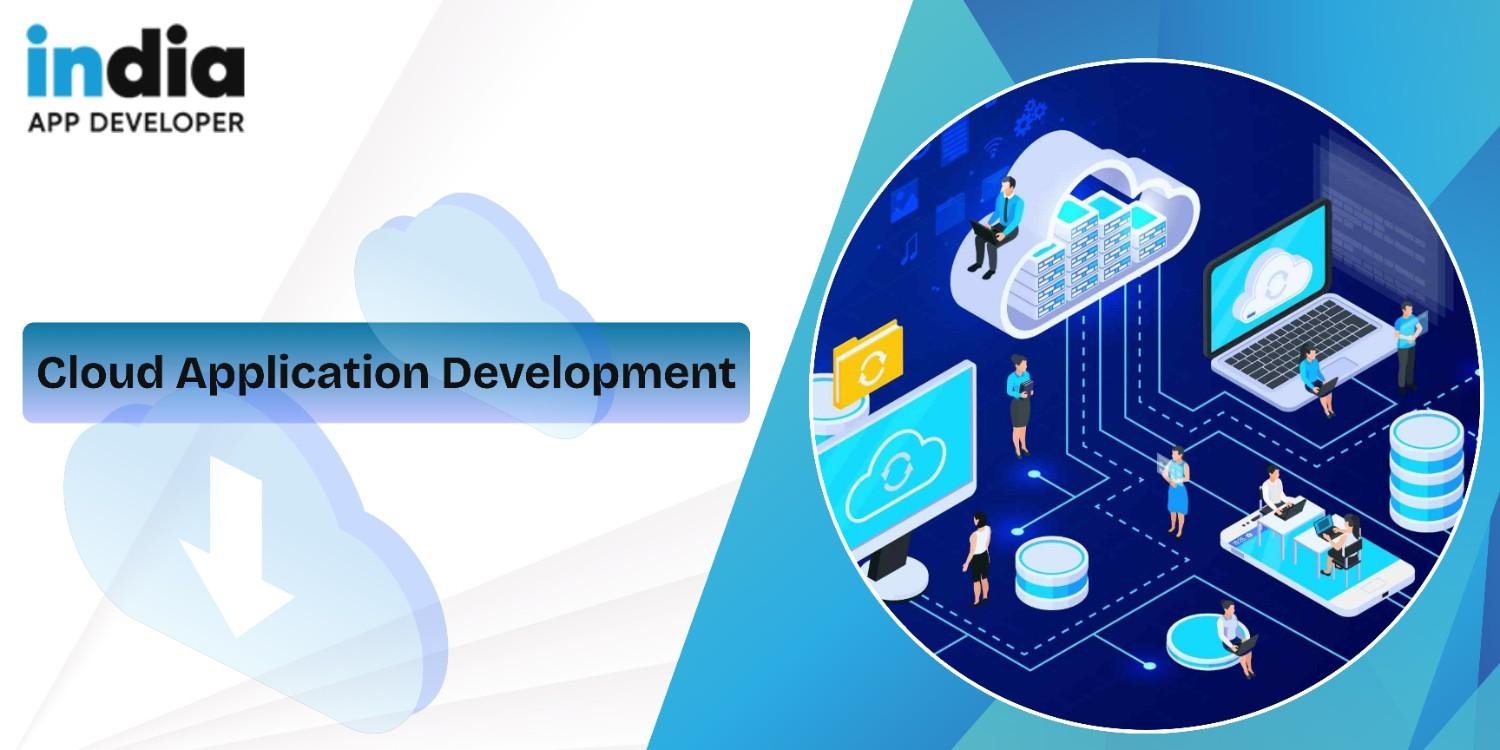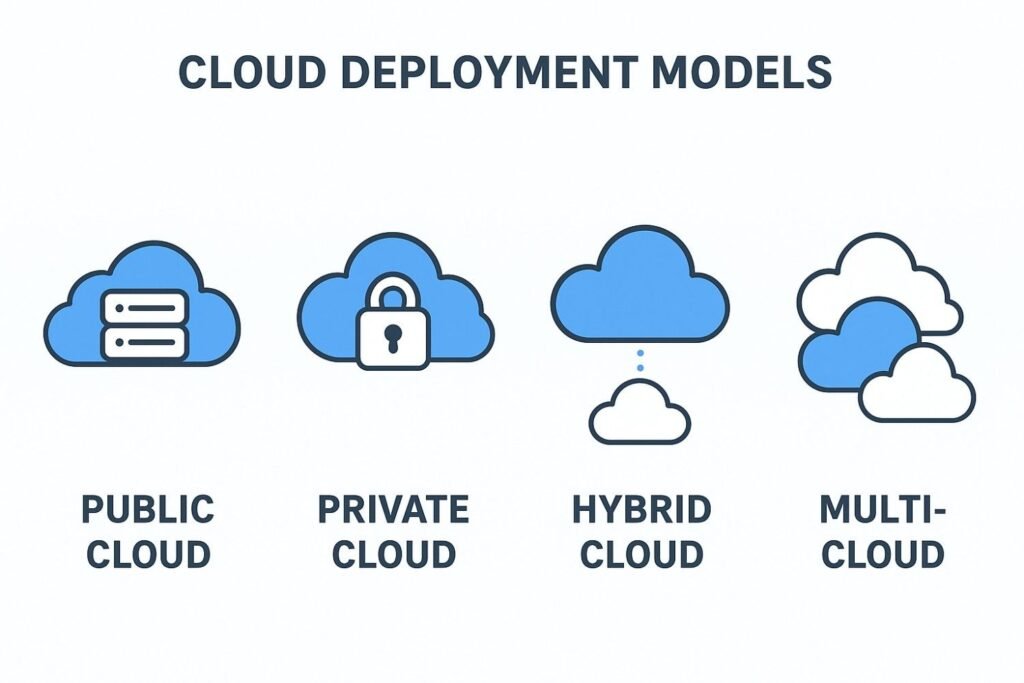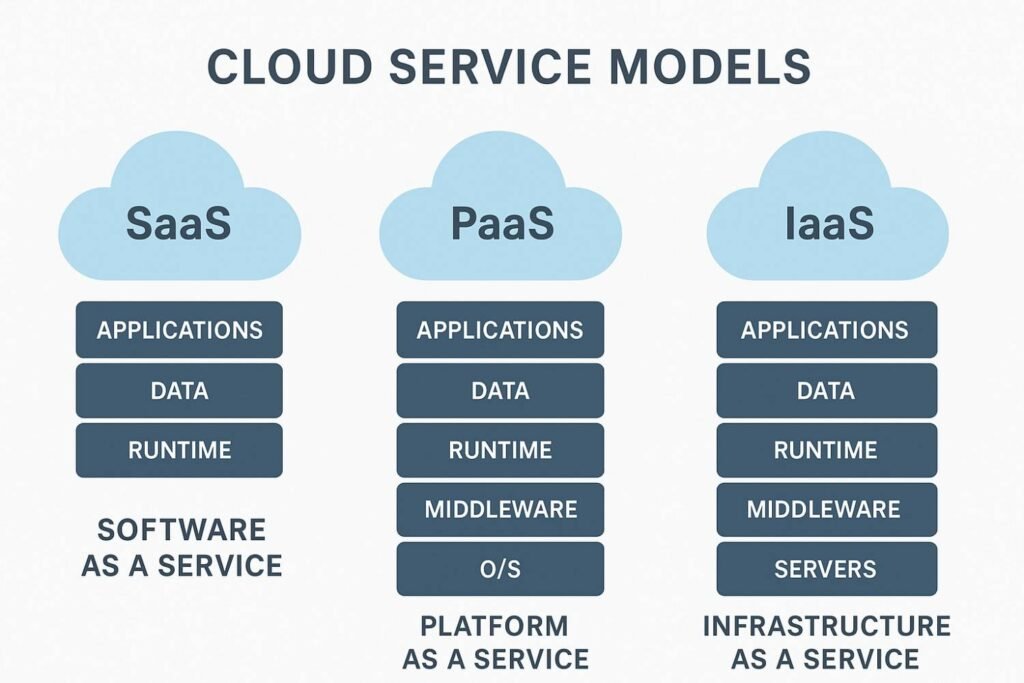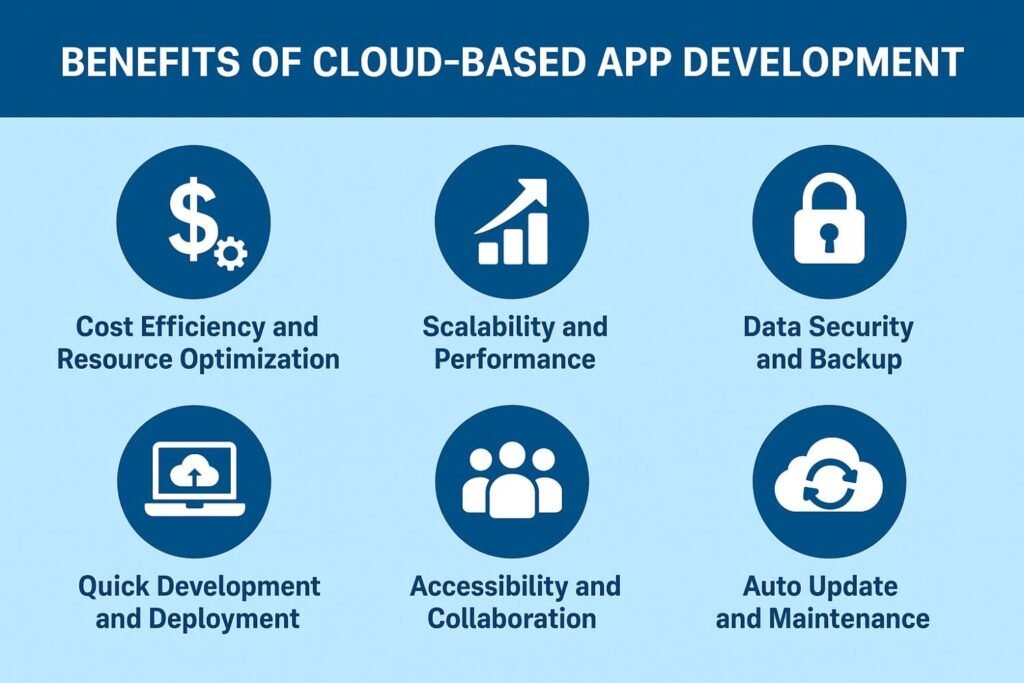Tell me one thing honestly: will you afford downtime, data loss, or limited scalability in today’s competitive digital economy? Of course not! Those traditional apps were completely dependent on physical servers and often went down. Moreover, maintaining and scaling those apps was extremely costly, and one also always gives a second thought to the vulnerability of data loss and security risks, right? Here, cloud-based app development came into the picture and changed the entire game.
Now, businesses can get global accessibility of their data, ensure high-tech security, and have cost-efficient operations just by hosting software and databases on secure and scalable cloud services. Actually, 60% of corporate data has already been moved and stored in the cloud, and the count is increasing day by day.
Companies are now shifting towards cloud application development, which actually streamlines internal workflow, reduces operational costs, and ensures quick services. India App Developer offers end-to-end services to develop a cloud application that ensures security and scalability.
What Is Cloud-Based App Development?
Let’s first understand what is a cloud in computing. So, the cloud in cloud computing is a network of remote servers that actually store, manage, and process data without using a local server or a personal computer.
While the application development in cloud computing is all about building software applications that use this cloud infrastructure, which guarantees seamless performance, real-time updates, and universal accessibility of the stored data.
Cloud app development is not like the traditional apps that depend on hardware; instead, it helps businesses by deploying applications on a distributed network, including AWS, Google Cloud, or Microsoft Azure.
Types of Cloud-Based Applications
The following are the models that are used for cloud-based application development, ensuring security and scalability.
(1) Based on Deployment Models
Public Cloud:
3rd-party providers manage the public cloud, which is best for startups and SMEs who need to look for cost efficiency.
Private Cloud:
It’s a dedicated environment that ensures high-tech security and customization, which is often used by enterprises or large-scale companies.
Hybrid Cloud:
It is a combination of private and public clouds, which ensures complete flexibility for businesses.
Multi-Cloud:
Multiple vendors can use this cloud to stop vendor lock-in and improve performance.
(2) Based on Service Models
SaaS:
Software as a Service, or SaaS, is a cloud service that manages a product entirely by the cloud service provider.
PaaS:
Platform as a Service, or PaaS, offers a smooth development and deployment environment to developers.
IaaS:
Infrastructure as a Service, or IaaS, is a virtual infrastructure that provides storage and networking opportunities to businesses.
What Are the Benefits of Cloud-Based App Development?
The following benefits clarify why businesses nowadays need to invest in cloud app development services and get agility, long-term savings, and operational efficiency for their business.
(1) Cost Efficiency and Resource Optimization
By investing in cloud-based software development, businesses can avoid expensive infrastructure investment. Moreover, the pay-as-you-go model ensures users pay only for the resources they use. The cloud-based app development ensures this flexibility, which actually allows startups and enterprises to manage budgets effectively and get robust performance.
(2) Scalability and Performance
The cloud platforms are actually built to scale the business. If the user base increases overnight, you naturally require more storage for data. Here, cloud development services automatically allocate additional resources without affecting the website’s performance.
(3) Data Security and Backup
Leading cloud service providers, like India App Developer, offer advanced encryption, identity management, and end-to-end monitoring of data to ensure maximum data security. They also offer built-in backup and recovery tools, so in case of a system failure, they can ensure protection of the data.
(4) Quick Development and Deployment
The application development for the cloud offers pre-built frameworks and automation tools that shorten time-to-market. Professionals can easily test, deploy, and update applications using the pre-built CI/CD pipelines.
(5) Accessibility and Collaboration
The cloud-based apps ensure easy accessibility anytime and anywhere; hence, teams can collaborate with each other across the globe. This is actually important for companies with remote teams.
(6) Auto Update and Maintenance
The cloud apps offer auto patching, updates, and version management that reduce downtime and IT overhead. Businesses can focus on other things while leaving the maintenance task to the cloud apps.
The Step-by-Step Cloud Application Development Process
(1) Requirement Analysis and Strategy Planning
Before starting the app development process, first, you need to understand the client’s goals, target audience, and key functionalities that you want in your cloud app. The requirement analysis helps you to understand whether the app needs a public, private, or hybrid cloud setup and which cloud (SaaS, PaaS, or IaaS) will fit best.
(2) Selecting the Right Cloud Platform
In the second step, you have to choose between AWS, Microsoft Azure, or Google Cloud, whichever one depends on your technical requirements, region, and budget. Each platform offers unique pros for application development cloud computing, including serverless architecture, AI-powered tools, scalable storage, seamless data migration, and more.
(3) Designing the Architecture
After choosing the platform, it is now time to design a complete, unique architecture that supports modular functionalities. There are many tools available for containerization, like Docker and Kubernetes for orchestration, for cloud-based app development that ensures flexibility and scalability.
(4) Choose the Right Tech Stack
You can choose from Java, Python, Node.js, and .NET for back-end development, while for front-end, we have options from React Native and Angular. The right tech stack ensures a smooth development process for cloud application development software.
(5) Development and 3rd-party App Integration
This is the stage where professionals start actual coding and integrate 3rd-party apps and tools, including payment gateways, CRMs, and analytics platforms. At India App Developer, we follow agile methodology and transparent DevOps practices to ensure improvement during end-to-end cloud app development.
(6) Testing and Quality Assurance
After completing the development process, the quality assurance engineers will test the app’s performance, scalability, and security using advanced cloud testing services to ensure the app works flawlessly across distributed environments.e, scalability, and security. This assessment checks app functions across multiple environments. Here, QA engineers will find and fix the bugs to deliver the final app to the client.
(7) Deployment and Monitoring
After the quality testing, the app is now ready for deployment on the chosen platform and continuously monitored using real-time analytics tools. A CI/CD pipeline enables automatic updates and reliability.
(8) Post-launch Maintenance and Support
A leading cloud app development company, India App Developer, offers post-launch maintenance and support. These services include updates, performance improvements, troubleshooting, and more.
What is The Cost to Develop a Cloud App in 2026
| App Type | Estimated Cost (Approximate Figures) | Development Time |
| Basic Cloud App | $30,000 to $60,000 | 3 to 5 months |
| Mid-level Cloud App | $60,000 to $120,000 | 5 to 8 months |
| Enterprise-Grade Cloud App | $120,000 to $300,000 or more | 8 to 12 months |
These are the approximate figures; they may vary based on project scale and feature set. The final figure of the cloud app development cost also depends on ongoing maintenance and infrastructure scaling.
We ensure cost-effectiveness while maintaining global quality standards. If you want to hire dedicated developers who specialize in end-to-end cloud application development services, then partnering with India App Developer will ensure seamless execution from planning to launching the app, and post-deployment support too.
Which Facts Affect the Cloud App Development Cost?
If you want to plan a budget for mobile app development, you first need to understand the following factors that directly affect mobile app development cost.
(1) App Complexity:
It includes the number of features, user roles, and integrations directly affecting pricing.
(2) Design Requirements:
UI/UX design complexity and customization impact the costs.
(3) Choice of Cloud Provider:
Various cloud providers (AWS, Azure, or GCP) have different pricing models.
(4) Security Measures:
Compliance, encryption, and additional security may increase the cost.
(5) Team Size and Developer Location:
Hiring a US-based team versus IT staff augmentation may vary the cost of app development.
(6) Post-launch Maintenance:
Regular updates, data monitoring, and customer support add to the total investment.
India App Developer, a trusted cloud application development company, provides a transparent pricing structure to ensure clients pay for value-driven outcomes rather than inflated quotes.
Emerging Trends in Cloud Application Development
(1) Serverless Computing
Serverless computing will no longer need to manage infrastructure. Moreover, it will enable auto scaling and efficient cost usage
(2) AI and ML Integrations
Cloud platforms supporting AI-driven tools for data analytics, personalization, and automation. This improves UX and decision-making.
(3) Edge Computing
Edge computing brings data processing closer to the user’s location, improving latency and application responsiveness.
(4) Multi-Cloud Strategies
To avoid dependency on a single provider, many companies now use a multi-cloud approach for better uptime and flexibility.
(5) Low-Code/No-Code Platforms
Businesses are adopting low-code cloud platforms that speed up application development for the cloud without extensive coding knowledge.
(6) Security Automation
AI-driven threat detection, compliance monitoring, and encryption tools improve overall data protection.
These are the emerging trends that are continuously redefining application development and cloud computing, which help businesses to offer quick, safe, and more efficient services to the end users.
Well-known Cloud Computing Application Examples
The following are some cloud computation application examples that actually work incredibly well.
- Netflix: Streams content to millions using AWS cloud.
- Dropbox: Stores and syncs data across devices using a hybrid cloud.
- Slack: The platform enables team communication through a scalable cloud-based framework.
- Google Workspace: This offers SaaS-based productivity tools like Gmail and Docs.
There are many brands like these that show how cloud computing app models improve performance, ensure cost savings, and guarantee scale-up of the business.
Choose India App Developer for Cloud-based App Development
We have a tested name as a mobile app development company and cloud app development company, catering to clients across multiple industries.
Our expert team provides custom cloud development services to build scalable, secure, and high-performing solutions. Whether you want to migrate an existing app or start from scratch, their engineers combine strategy, innovation, and technology to deliver measurable results.
Our custom cloud app development services are designed to ensure agility, cost control, and long-term success. Businesses looking to hire app developers or build next-gen cloud platforms can trust India App Developer’s experience and proven track record.
Moreover, cloud-driven technology is the near future of all businesses; hence, almost all businesses that adopt cloud-based application development today will have a more resilient, scalable, and competitive future.
If you need to build a data-driven enterprise platform, a cross-platform mobile app, or an intelligent SaaS product, using application development in cloud computing offers a pathway to innovation and efficiency.
Partnering with an experienced cloud application development company like India App Developer helps you transform ideas into high-performing digital products.
So, are you ready to modernize your business? Reach out to India App Developer now to discuss your cloud app development requirements and build a future-ready digital ecosystem that drives growth.









